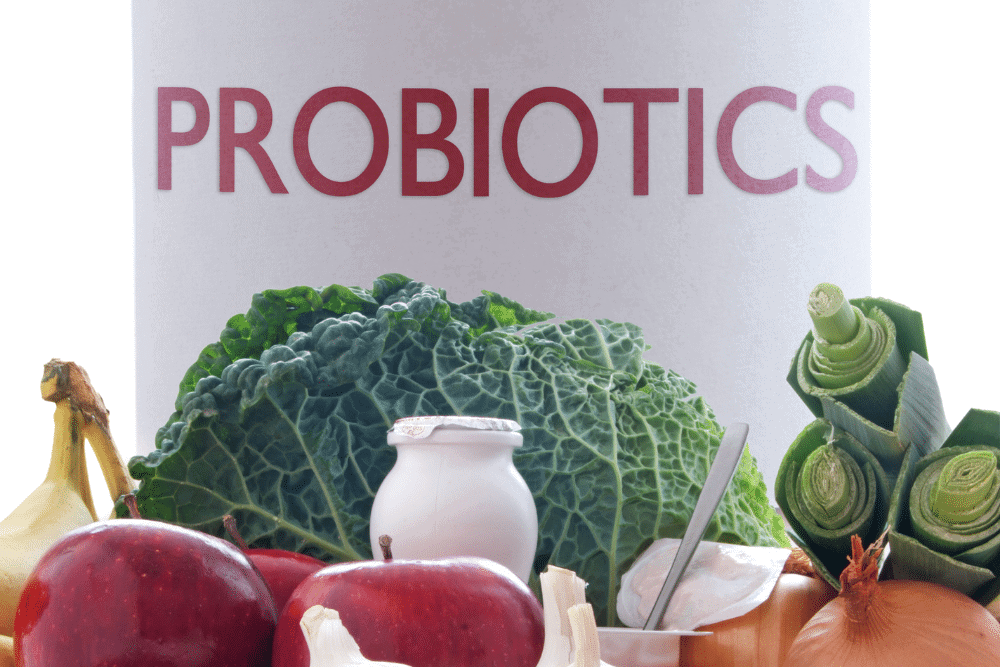Bacteria are normally viewed in a negative light, many soaps and sprays are advertised to kill 99.9% of bacteria, but have you ever wondered why it is 99.9% and no soap company has made a soap that kills 100% of bacteria?
It is because sometimes bacteria can be good, there are many good bacterias out there, and probiotics are a combination of these good bacterias that live naturally in your body.
These good bacteria help keep your body healthy and make sure everything is working well, they also fight off bad bacteria and help you feel better when you are sick.
Probiotics are part of a family of diverse and important organisms that live inside your body in what is called a microbiome. Similar to a larger biome, like a rainforest, everything in the microbiome plays its part and works together to maintain your body’s health.
This community of organisms is made up of microbes of which you have trillions living in your body right now, these microbes would be a combination of fungi, protozoa, viruses, and bacteria.
These microbes are mostly connected to your gut and large intestines but you have several parts of your body that are home to good microbes.
These locations are places on your body that connect to the outside world in a way, for instance, food comes from the outside world and into your gut, therefore you have a bunch of microbes working in your gut to make sure the outside world doesn’t harm your body. Other places you’ll find microbes in your body are your mouth, lungs, skin, vagina, and urinary tract.
How Do Probiotics Keep Me Healthy?
There are many ways that probiotics and good bacteria keep your body healthy. When you are sick, there is an influx of bad bacteria in your body, meaning the bad bacteria outnumber the good bacteria, which kicks your body off balance.
The probiotics then fight off this bad bacteria until there is a healthy balance in your body once more.
As well as helping balance out the bacteria in your body when you are sick, there are other ways that probiotics are constantly working to keep you healthy:
- including breaking down and absorbing medications
- creating important vitamins
- helping you digest food
- helping the cells that line your gut stop bad bacteria that have made their way to your stomach through food or drink from entering your bloodstream.
Do I Need To Take Probiotic Supplements?
Probiotics can come from the food and drink that could already be in your diet, most fermented foods, such as pickles and yogurt, are home to a number of good bacteria that can help your body get the right balance of probiotics.
There are also a few fermented drinks that you can try that are packed full of good bacteria such as kombucha, which is fermented tea, and kefir, which is a fermented dairy drink. There are plenty of food and drink options that are packed with probiotics, such as:
- Yogurt
- Pickles
- Kombucha
- Kefir
- Sourdough Bread
- Cottage Cheese
- Miso Soup
- Buttermilk
- Sauerkraut
- Tempeh
- Kimchi
Introducing these foods into a well-balanced diet will help with the probiotic balance in your body, especially your gut. When buying these foods, check the label for âlive and active cultures’, which means that the food or drink is full of good bacteria.
You can also take probiotic supplements if you feel you aren’t getting enough probiotics in your diet, probiotic supplements can come in a variety of forms including pills, food, drink, or powders. You should always check with your healthcare provider before adding a new supplement to your diet.
Read on here to find out how long it takes for probiotics to work.
So, Do Probiotics Cause Gas?
Yes, when you first start taking probiotics you may experience some gas and bloating. However, these are usually short-term side effects that will subside once your gut biome has adjusted.

Side Effects Of Taking Probiotic Supplements
There are many health benefits of taking probiotics, such as improved digestion and a lower risk of infection. However, there can be some mild side effects that will only affect a minority of people. If you have a compromised immune system or a serious illness these side effects can become more severe.
Gas And Bloating
This is the most common side effect of taking a probiotic supplement or having too many probiotics in your diet. If you are taking probiotic supplements that are bacteria based then you may get gas or bloating, however, if you are taking probiotics that are yeast-based then you may experience increased thirst or constipation.
It isn’t exactly known why probiotics cause gas, bloating, thirst, or constipation, but typically these symptoms will subside within a few weeks of continued use. It’s actually a good sign that probiotics are working for you.
If you are worried about getting these side effects then make sure to start with a lower dose of probiotic and slowly make your way up to the recommended dose over a few weeks. This helps your body to adjust to them.
If any of these side effects continue for a longer period than two weeks then we advise you to stop taking the probiotic and consult your doctor.
Here is a list of the best over-the-counter gas and bloating medicines.
Headaches
Probiotic-rich foods such as yogurt, kimchi, and sauerkraut contain biogenic amines which are substances that form when food that contains protein is fermented or aged.
Some common biogenic amines that are found in probiotic-rich foods include tyramine, histamine, tryptamine, and phenylethylamine. These biogenic amines can increase or decrease blood flow by exciting the central nervous system, which can trigger headaches in minor cases. T
These biogenic amines are very uncommon in probiotic supplements, so if you are getting headaches from eating too much probiotic-rich food then it may be best to move over to a probiotic supplement instead.
Can Increase Infection Risk For A Minority
Probiotics reduce the infection risk in the vast majority of the population and are one of the best supplements for building an immune system. However, for a small minority, probiotics can increase the risk of infection.
In very rare cases, bacteria or yeast that are found in probiotics can enter the bloodstream and cause infections.
Those at greater risk of this happening include people with suppressed immune systems, venous catheters, prolonged hospitalizations, or those who have recently undergone surgery.
Although the risk of developing an infection is low, it is important to check with your doctor if you should take probiotics, especially if you are at greater risk.
Final Thoughts
Probiotics are a very good way of combating infection and helping digestion, and although they come with some side effects, the more common ones are unthreatening and will subside within a few weeks.
If you are unsure about taking probiotics or you have had a longer period of side effects, then stop taking probiotics and contact your doctor.
Disclaimer: this article does not constitute or replace medical advice. If you have an emergency or a serious medical question, please contact a medical professional or call 911 immediately. To see our full medical disclaimer, visit our Terms of Use page.
Related Articles
Should You Be Taking Probiotics with Antibiotics?
Who Should Not Take Probiotics?










